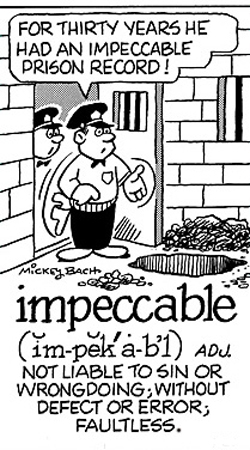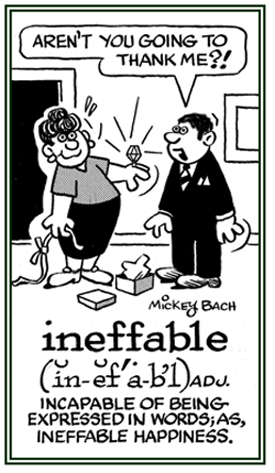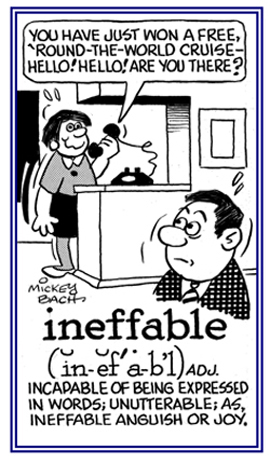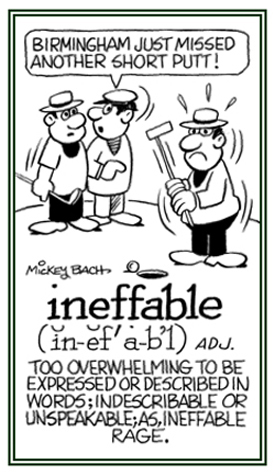-ability
(Latin: suffix; expressing ability, capacity, fitness, or "that which may be easily handled or managed")
Just a few examples out of hundreds of words presented as the noun forms of -able; forming nouns of quality from, or corresponding to, adjectives in -able; the quality in an agent that makes an action possible. The suffix -ible has related meanings.
2. Concerning something or someone being without faults or errors: Dr. Brown’s reputation as an impeccable physician makes him a desirable consultant for other medical doctors.

Go to this Word A Day Revisited Index
for a list of additional Mickey Bach illustrations.
2. Etymology: from Middle French imprenable; im-, "not", + prendre, "to take" + -able, "able to be the object of an action".
2. Something doubtful, dubious, questionable, or unlikely: Catching the flu makes you feel terrible and also makes it a real improbability to laugh or even smile!
2. Absence of enough power, capacity or resources: Although Tim had been in school for many years, he still had the inability to read up to grade level.
The death of an individual is an inalterable fact that cannot be reversed.
2. Incapability of being altered, as in disposition or habits: The incurability of Ginnie's incorrigible weakness and foible of stopping at every bookstore to browse through the newest editions of her favorite author was not to be altered!
2. Relating to something that is so great that it can't be verbally communicated or described: When Caleb won the singing contest, he was overcome with ineffable joy and excitement.



Go to this Word A Day Revisited Index
so you can see more of Mickey Bach's cartoons.
2. Quick or easy arousal to a strong emotion; excitability: The inflammability in Jim's temperament was evident when he felt that he was accused of something he did not do or say at all!
Historically, "flammable" and "inflammable" mean the same thing, however the presence of the prefix "in-" has misled many people into assuming that inflammable means "not flammable" or "noncombustible".
The prefix "in-" as used in inflammable is not, however, the Latin negative prefix "in-" which is related to the English "un-" and that appears in such words as "indecent" and "inglorious".
The "in-" used in inflammability is an intensive prefix derived from the Latin preposition "in". This prefix also appears in the word "enflame", but many people are not aware of this derivation, and for clarity's sake it is advisable to use only flammable to give warnings.
2. The capability of being present in something: The attic at Joan's house provided the inhabitability of storing many old books and trunks full of memories of the family.


